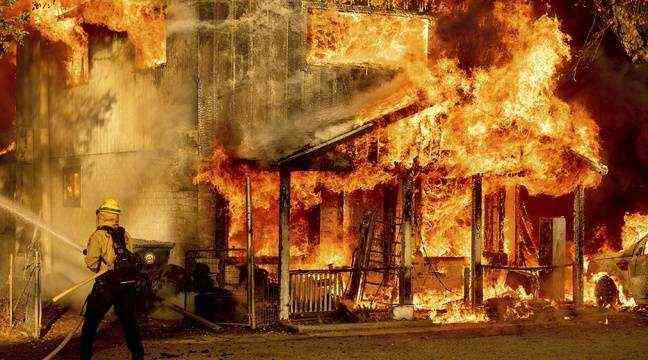The American West, in the United States as well as in Canada, is in flames. With the heat wave and persistent drought affecting the area, hundreds of thousands of hectares have already gone up in smoke and this is just the beginning.
In the United States, California, Oregon, Arizona, Idaho… none of these states is spared by the fires which are currently devastating some 350,000 hectares of vegetation, according to the authorities’ latest report. While 2020 was the worst year in modern California fire history, 2021 may already be breaking that record. The fires have now consumed twice as much vegetation as at the same time last year, according to state fire management officials.
Two firefighters dead on duty
In northern California, multiple fires fueled by heat and increasing winds devour the vegetation at full speed. The assembly of several fires caused by lightning has already devastated more than 36,000 hectares, destroying several homes in its path. Evacuation orders were also issued just south of the famous Yosemite National Park. Above all, the proliferation of these blazes unfortunately pushes those who fight them to take more and more risks. Two Arizona firefighters were killed this weekend in their plane crash during a fire monitoring mission.
In neighboring Canada, the picture is just as bleak. More than 157,000 hectares are currently burning in British Columbia, a province in the grip of another heatwave. Authorities predict, however, that it will be “less aggressive” than the heat wave of less than three weeks ago, when a village not far from Vancouver had recorded a national record of 49.6 ° C.
Water and electricity rationed
Faced with the multiplication of these climatic disturbances, the inhabitants of the whole of California were invited Monday to unplug their unnecessary devices, turn off their air conditioning and their oven from 4 p.m. to 9 p.m., in order to voluntarily ration their electricity consumption. . Last week, the governor had already urged the population to reduce their water consumption by 15%, for example by reducing the irrigation of lawns and taking shorter showers.
The American West is caught in a devastating vicious circle: arid soils and parched vegetation in turn create the conditions for rising temperatures. Higher mercury, repeated heatwaves and reduced precipitation in places are also an ideal combination for the development of fires. The summer is therefore likely to be very long.

